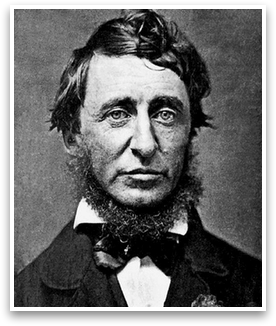
Author Name
For someone who was considered a "failure" by his neighbors because of his failure to live up to his early potential, Henry David Thoreau did fairly well all things considered. His influence is far reaching - including social theory, philosophy, politics, and literature. Though he died young at the age of 44, Thoreau's individualistic philosophy has made an indelible imprint on the American spirit.

Themes and Facts
- Thoreau was heavily influenced by Emerson and the Transcendentalists.
- Graduated from Harvard, but was known (ironically) by his neighbors as a someone who didn't live up to his potential.
- Like Emerson, Thoreau's journal was one his finest literary achievements.
- Thoreau was offended both by slavery and America's role in the Mexican-American War.
- "Resistance to Civil Government" is perhaps his most far-reaching publication, influencing everyone from Ghandi to Martin Luther King, Jr. It focuses both on the limitations and weakness of the federal government and appropriate responses to unjust laws.
- From a literary perspective, Walden is Thoreau's greatest achievement. He focuses upon the importance of individual freedom, self-reliance, and nonconformity.
Study Questions
- In a couple of sentences, describe Thoreau's philosophy of government.
- What is Thoreau's criticism of so-called "majority rule"?
- Is Thoreau's understanding of civil disobedience compatible with our current understanding of democracy? Did Thoreau himself believe in a democratic form of government?
- Thoreau's life on Walden was an idealistic experiment that he sustained for only around two years. What are the weaknesses with this experiment? Is it sustainable long term? What can we learn from Thoreau's life on Walden even if we choose not to mimic his spartan existence there?
Thoreau's influence is far-reaching. Countless individuals in the last 150 years who have questioned unfair laws, the role of the federal government, or the viability of an self-reliant existence owe a debt to Henry David Thoreau.